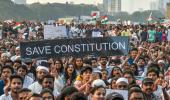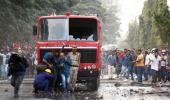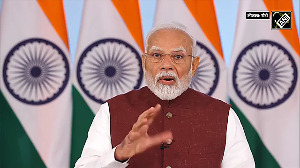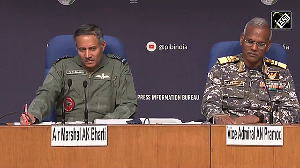'Amit Shah needs to understand that we are not against Hindus. But we need to preserve our ethnic character.'
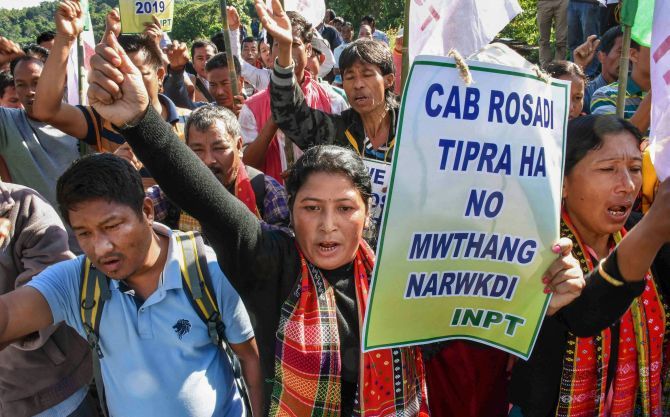
Like the rest of the country, there is anger simmering in Tripura against the Citizenship (Amendment) Act.
The anger has a face -- the son of its last king and the sole heir of the 800-year-old Manikya dynasty.
Pradyot Bikram Manikya DebBarma has filed a case in the Supreme Court against the CAA.
"Unfortunately, today, people are more interested in building statues of Sardar Patel than keeping the assurances he gave us," DebBarma tells Savera R Someshwar/Rediff.com in the concluding segment of a two-part interview.
So when the government talks to you, what do they say?
They try to convince us that CAA is in the interest of the nation.
In your opinion, was your meeting with Amit Shah last month a white-washing exercise?
No, no... Amit Shah was very polite and receptive. But he needs to understand that we are not going to compromise on certain things.
He needs to call us again. He needs to understand one thing that we are not against Hindus. But we need to preserve our ethnic character also.
As the ruling royals of Tripura at Independence, your family decided to join India instead of Pakistan because you believed your culture, identity and land would be protected. Do you feel the same way today?
The instrument of accession clearly says that the Government of India will preserve our culture, language, religion and demography.
Based on these assurances, we merged with India. Today, those assurances have been violated.
And it is not just only the instrument of accession. The TNV (Tripura National Volunteers) agreement of 1988 with Rajiv Gandhi has been violated; the ATTF (All Tripura Tribal Force) agreement of 1993 has also been violated.
The Government of India keeps signing agreements with us, saying we'll honour and uphold our word. But they don't. The CAA is the latest violation.
Can you explain how CAA goes against the instrument of accession?
An instrument of accession is a treaty, just like the Indo-Nepal treaty or the Bhutan-India treaty.
Before two sovereign powers come together as a common identity, they agree to certain terms that become sovereign guarantees.
When Sardar Patel assured the people of Tripura that he will look after us, we believed him.
Unfortunately, today, people are more interested in building statues of Sardar Patel than keeping the assurances he gave us.
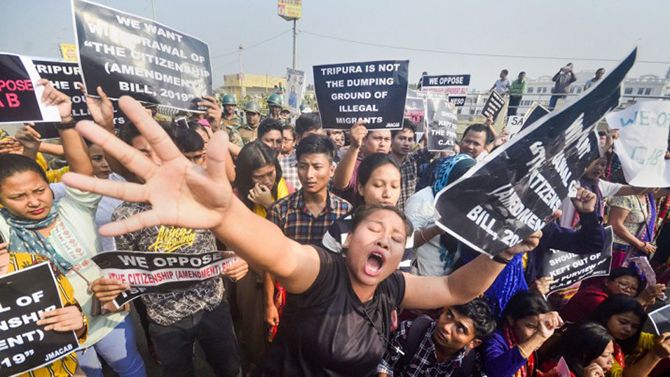
How problematic is it that the north east is often lumped into one umbrella?
It is not one umbrella. It is different.
It's like saying, oh, you are a south Indian. Karnataka is different, Tamil Nadu is different, even Telangana Rayalseema is different from Andhra.
There is a ministry called DONR, development of the north east region. It's ridiculous, what is the north east region?
There are eight different states, with different languages, different problems and different solutions.
There is no such thing as the north east. Talk to us individually; don't talk to us as a region.
There is a water dispute between Karnataka and Tamil Nadu; it is not called a south Indian problem.
There is a pollution-related dispute between Punjab and Delhi due to stubble burning; it is not referred to as a north Indian problem.
When you refer to something as a north eastern problem, it just shows lack of application of mind.
Tripura is one of the five states that has an open border with Bangladesh.
Yes, and the only state where the original population now comprises one third of the people from Bangladesh.
Do your demands include a closed border?
My point is that when Tripura had the Restricted Area Permit, people still came in.
While we do want a closed border, we also don't want any more people to come in. We don't want illegal people to be stakeholders in our future. Let Indians decide (our future). Why should people from Bangladesh do so? That's what's happening now.
Do you believe that Tripura too needs to be an ILP (Inner Line Permit) state?
ILP stops you from coming in.
You are an Indian. And why should I stop an Indian from coming into my state? Indians should come and see the plight of our people. ILP will just keep us in a vacuum.
We had RAC till 1995, it didn't do anything.
I don't want the ILP. I want no CAA in my state.
You tweeted that the Sixth Schedule (tribal areas) areas in Tripura will be exempted from this Act.
Let me explain.
You don't need permission to visit Shillong or Cherrapunji, though it's a Sixth Schedule area.
If you want to go Kaziranga, you have to go through a Sixth Schedule area, but you don't need any permission.
There is no provision to stop people from entering a Sixth Schedule area. The only provision is that you can't buy property.
Otherwise, you can do anything you want. It does not stop you from becoming a voter. How can you stop them from voting? It's all hogwash.
What relief do you hope to get from the Supreme Court?
I have filed my case in the Supreme Court and notices have been issued.
The Government of India now needs to answer because the facts, Tripura-specific, are that the Government of India signed an instrument of accession with Tripura, the Government of India signed the TAV accord and the ATTF accord and they assured us about our rights in these three agreements.
On what grounds have they exempted Mizoram, Manipur, Arunachal -- where they had not given any assurance – and not exempted us?
Yes, the Assam Accord is there. But we have three agreements including the Sardar Patel instrument of accession. Our case is strong.
When you see the protest against CAA spreading across India, what does it make you feel?
It has become a Hindu-Muslim issue.
But, in the north east, it's about ethnicity.
We don't want Bangladeshi Muslims. We don't want Bangladeshi Hindus.
If the Government of India feels they need to be accommodated, let them do it in Gujarat, Maharashtra, Madhya Pradesh, Rajasthan.
We cannot take the burden anymore.
